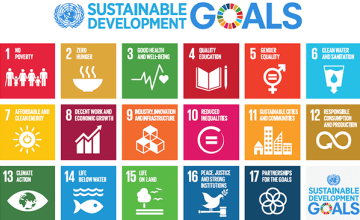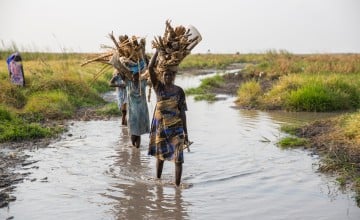
Read our 2023 annual report

Knowledge Hub
Counting the cost: Financing and delivering on the promise of Agenda 2030

In the second of a series of blogs on the Sustainable Development Goals, Dominic MacSorley reflects on the shared challenges and opportunities we face in achieving Agenda 2030.
With 17 Global Goals and 169 targets, the Sustainable Development Goals (SDGs) are big, bold and spectacularly ambitious. From eradicating poverty and hunger to achieving societal equality and a sustainable planet, their remit covers the earth, the oceans and everyone and everything on it. They represent the most ambitious multilateral plan for action in history.
But beyond their scale and scope, they are achievable. The SDGs were not born out of naive utopianism, they were forged in knowledge that we have the science, technology and ability to eradicate the world of poverty, hunger and injustice. If we have learnt anything in the last 10 years it is that where there is a concerted allocation of resources, change can be transformative. That’s the good news.
Are we on track to achieve the SDGs?
The bad news is that with only 13 years to go, we are way off track. Currently, 1.5 billion people live in multidimensional poverty and almost 800 million people still go to bed hungry every night. Perhaps most worryingly, following years of a positive downward trend, global food insecurity is now surging, with over 100 million people severely food insecure last year. In East Africa, Yemen and Nigeria, this food insecurity has reached catastrophic levels with well over 20 million people at risk of starvation – an unprecedented number in the modern era of humanitarian response.
Mass starvation in the 21st century is a disgrace and serves as clear evidence that our business as usual approach is unjust, immoral and unsustainable.
The resources are there to end hunger, starvation and extreme poverty. The question is do we have the political will and the courage to make the tough decisions? Political will isn’t just some abstract commitment, it will demand national sacrifice for a greater global good and fundamental shifts in policy to change the course of our future.
The task ahead seems overwhelming but there are a number of fundamental shifts that need to happen immediately if we are to get any closer to creating this more just, more sustainable, more human future.
Working in solidarity towards achieving the SDGs
At the risk of stating the obvious, Agenda 2030 can only be achieved by working together. Although each nation state reports on their progress towards the Goals, the SDGs are not just about individual progress, who is doing better on what goals. It’s not a competition, it’s about complementarity. That means embracing multilateralism, supporting global coordinated efforts towards achieving the SDGs such as the Paris Climate Change Agreement and the Comprehensive Refugee Response Framework.
It also means sharing best practice, where nations that have excelled in a particular area form closer ties with nations that are lagging behind. It means deep involvement from the private sector which to date has not surfaced sufficiently as a key contributor to the goals. And it means engaging civil society movements such as Coalition 2030 that have a central role in pushing for the fundamental rights that are imbued in the Sustainable Development Goals.

Focus on the poorest and most vulnerable
The fundamental principle of the SDGs is ‘Leaving no one Behind’ and the spirit of the Goals compels nations to try to reach the furthest behind first. Although overseas aid spending has risen in recent years, much of this has been directed towards domestic spending on refugee resettlement. The needs of migrants and refugees in Europe must be met, but not at the expense of those less visible, and even more vulnerable.
Leaving no one behind is about directing resources to where the needs are greatest, with an unwavering focus on the poorest of the poor. That means the stateless, the disposed, the marginalised, and the 140 million people who are now in desperate need of humanitarian assistance.
Ireland has had a clear focus on the least developed countries and fragile states, making significant contribution towards lasting change where it is needed most. This is where poverty is increasingly located, where our focus must remain and where others must concentrate their overseas aid programmes.
Financing the future: investing in the next generation
With 17 goals and 169 individual targets, the SDGs are immense, and indeed costly – an estimated $3 trillion a year. Supporting universal health care and education in the poorest countries alone will require around $84 billion annually – but the resources are undoubtedly out there. We live in an age of unprecedented inequality, where just 2,043 individuals have a collective wealth of over $7.7 trillion and where eight men now own the same amount of wealth as the poorest half of the world.
As Jeffrey Sachs reminded us at last week’s meetings, there is no absence of money, there is only an absence of honesty. The SDGs are affordable and in fact are a smart business proposition. The alternative for not investing in building resilience of the poor and strengthening disaster risk reduction is not only unethical, it is progressively unsustainable. Economic losses from increasingly frequent natural disasters are now reaching $250 to 300 billion a year, underscoring the imperative to address climate change prevention as well as mitigating its effects on the poorest and most vulnerable.
There is no greater, more costly obstacle to achieving the SDGs right now however, than conflict. In addition to its devastating human toll, conflict, war and violence costs an estimated 13 trillion dollars a year, a financial calculation that doesn’t factor in the brutality of lives lost, damaged, and disrupted. Balance that with the $3 trillion required to fund the SDGs. Investment in jobs, factories schools and roads seems a lot smarter than tanks, bombs, death and destruction.
Confront the inequality
In 2017, two years since the beginning of action on Agenda 2030, the score card shows some progress but where it matters most, where the needs are greatest, the goals could scarcely be further from being realised. Conflict, climate change and inequality are worsening, and their effects on the poor are becoming increasingly devastating. Aid works and has a critical role to play but ultimately if we are to truly deliver on leaving no one behind, then we must confront the power relationships and vested interests that keep the poor where they are – the systems that perpetuate inequality and prevent real change. The opportunity is there, the challenge for all of us now is to embrace it and fundamentally change how we live and work in order to deliver on Agenda 2030.
Look out for Dominic’s final blog in this series which will focus on Ireland’s role in achieving the Sustainable Development Goals.
Find out more
Follow Dominic on Twitter.
Read more


